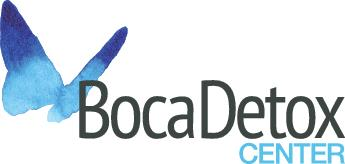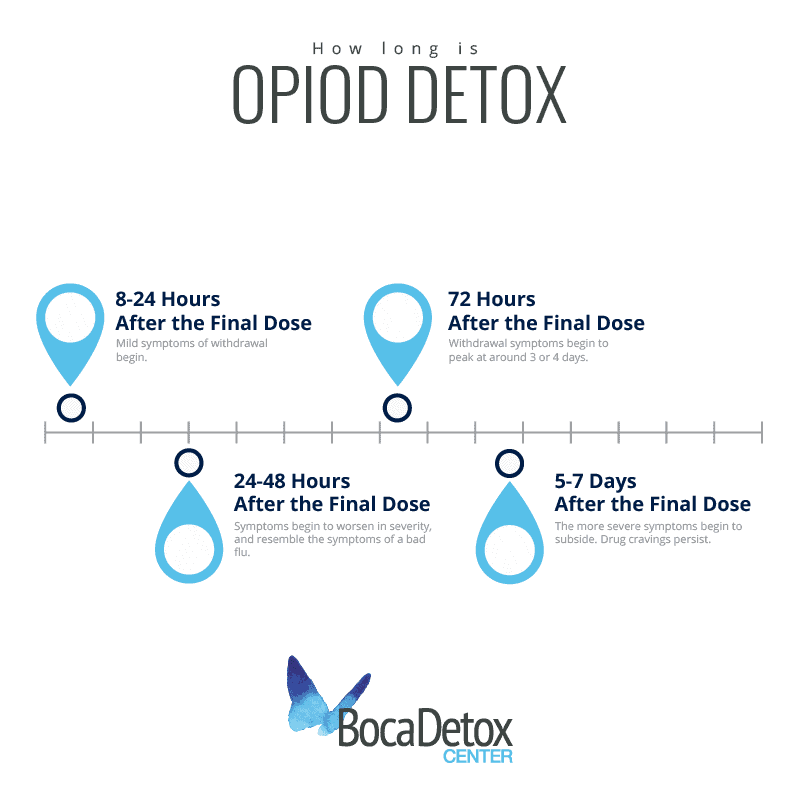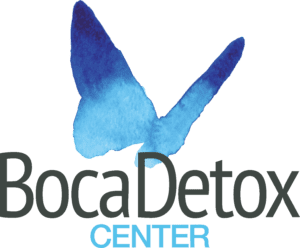Medically Monitored Opioid Detox
at Boca Detox Center
at Boca Detox Center
The initial step on every journey of addiction recovery is admission to a medically assisted detoxification center. Those who have been abusing drugs or alcohol for any period of time almost always undergo some degree of withdrawal upon abrupt cessation of use. More often than not, the symptoms of withdrawal will lead a person back to substance use before the detoxification process is over. This is part of the reason why entering into an inpatient opioid detox program is so important.
At Boca Detox we provide a comprehensive detox program; one that focuses on more than a safe, pain-free drug and alcohol withdrawal. In addition to providing around the clock medical care, we actively prepare our clients for the next appropriate stage of their personal recovery journeys. During opioid detox, we conduct an individualized, in-depth evaluation, which helps us determine the length of our clients stay, what kind of medical intervention is necessary, and the next step for each client once they become physically stabilized.
The Boca Detox Center Method: Opioid Detox
At Boca Detox, we take a unique approach to opioid detoxification. Whereas state-funded facilities and hospital settings offer standardized, impersonal care, we treat each of our clients on a highly individualized basis. The Boca Detox method focuses on more than physical stabilization. We work to adequately prepare our clients to take the next appropriate step on their personal journeys of addiction recovery. While medical detox is an important initial step on the road to recovery, it must be closely followed by a higher level of care in order to be truly effective. As part of the Guardian Recovery Network family, we work closely with several of the top residential rehabs and outpatient treatment programs in the country. Once you have undergone a safe, pain-free opioid withdrawal and have been deemed physically stable, we will help you determine which level of care is right for you. Contact us today to learn more about opioid withdrawal treatment options, or to get started on your own personal journey of recovery.
The Boca Detox Center Method: Opioid Detox
At Boca Detox we firmly stand by the belief that medically monitored detox is a necessary first step when it comes to addiction recovery. We understand that individuals who have been suffering at the hands of a moderate or severe opioid addiction will be extremely apprehensive about undergoing the potentially painful process of opiate withdrawal. We want to ensure those who are considering seeking treatment that the withdrawal process does not have to be uncomfortable. We designed a pain-free detox program with client comfort and safety in mind. Our private, homestyle retreat detox facility offers clients the amenities and resources they need to successfully make it through opiate withdrawal and transition on to the next appropriate level of clinical care.
What Are Opioid Narcotics?
Opioids are naturally-derived drugs that are generally used in the treatment of pain. There are illicit opiates as well, such as heroin and opium. Some naturally occurring opiate drugs include codeine and morphine, and some opiate derivative drugs include hydrocodone and oxycodone. Opioids is a blanket term for naturally occurring opiates, opiate derivatives and synthetic, man-made opioid narcotics. Over the course of the past two decades, opiate abuse and addiction have become major health-related concerns throughout the United States. According to the National Institute on Drug Abuse, data from 2018 shows that there are roughly 128 opiate-related overdose deaths in the US on a daily basis. The misuse of prescription opiates and illicit opiates like heroin is a serious and widespread issue – one that claims the lives of thousands of innocent men and women on an annual basis. Opioid addiction is a chronic disease, and it will require professional treatment. Without treatment, the symptoms of opiate addiction will continue to worsen over time.
What is Opioid Addiction?
Opiates act as central nervous system depressants. When an individual uses an opiate narcotic, his or her basic functioning will be significantly compromised. Humans all have opioid receptors within their brains. In a normally functioning brain, these receptors will work together with neurotransmitters to help the brain control functions like sleep, breathing, pain and cognitive ability. Opiates bind to these receptors blocking out the neurotransmitters, which will in turn block the perception of pain. Prescription opiates are painkillers, and they can be extremely effective when used in a medical setting or prescribed by a licensed and experienced physician. However, if opiates are used for an extended period of time, the brain and the central nervous system will grow accustomed to them.
As the body adjusts to regular doses of opiates, it will start to build a tolerance – meaning that larger amounts of the drug will be required in order for the same result to be experienced. Tolerance is one of many telltale signs of opiate addiction. Once an individual develops a physical and psychological dependence, the only way to successfully overcome the addictive disorder is to seek professional help. When it comes to opiate addiction, medical detox is always a necessary first step. At Boca Detox we have carefully designed an integrated and highly individualized detox program to help men and women of all ages and walks of life successfully overcome opiate addiction long-term.
We Are Here For You
Let Us Help You Heal
Our detoxification experience is second to none.
Learn how we can help by speaking with one of our Treatment Advisors today.
Signs of Opioid Misuse & Dependence
A study published by John Hopkins Medicine reads, “Opioid use disorder is a medical condition defined by not being able to abstain from using opioids, and behaviors centered around opioid use that interfere with daily life. Being physically dependent on an opioid can occur when someone has an opioid use disorder, and is characterized by withdrawal symptoms such as cravings and sweating.” If you or someone you love has been struggling with an opioid use disorder of any severity, Boca Detox is available to help.
If you believe you or someone you love has been suffering from a diagnosable opioid use disorder, there are several signs and symptoms to keep an eye out for. The Diagnostic and Statistical Manual of Mental Disorders, Fifth Edition (DSM-V) outlines a list of diagnostic criteria used to identify the presence of an opioid use disorder. If you answer “yes” to two or more of the following questions, seeking professional help from a medical detox center is likely a good idea.
- Do you sometimes end up using more opioid narcotics than you originally intended, or do you use opioids more frequently than you intend to?
- Have you wanted to cut back on your dose or quit entirely, only to find you were unable to do so for any significant period of time?
- Do you spend a significant amount of time obtaining opioids, using opioids and recovering from their effects?
- Do you often think of using opioid narcotics/do you ever experience intense cravings?
- Has your drug use interfered with your ability to fulfill personal obligations or negatively impacted your performance at work or at school?
- Have you experienced interpersonal problems as a direct result of your opioid use?
- Have you given up activities which were once interesting or important to you in order to engage in opioid use?
- Have you been engaging in risk-taking activities more often than normal, like driving while under the influence of opioid narcotics or combining opioids with other substances like alcohol or benzodiazepines?
- Do you continue to use opioids despite physical or psychological health concerns directly related to your drug of choice?
- Have you developed a physical tolerance, meaning a higher dose is required in order for the desired effects to be achieved?
- Do you experience withdrawal symptoms when opioid use is stopped abruptly?
At Boca Detox we understand how hopeless those suffering from an opiate addiction might feel. We also understand that reaching out for help is a major step — one that many people do not take. If you or your loved one has been suffering from opiate abuse or addiction, Boca Detox is here to help. Our compassionate and knowledgeable staff members will walk you through every step of the detox process, ensuring that you feel safe, comfortable and supported the entire time.
Our Detox Services Include
What are the Signs and Symptoms of Opioid Withdrawal?
If an individual has been abusing opiates for any length of time, he or she will experience symptoms of withdrawal upon abruptly ceased use. At Boca Detox we utilize numerous detoxification techniques to help alleviate these symptoms while making them as short-lived as possible. While the symptoms of opiate withdrawal are not generally life-threatening, they can be harshly uncomfortable — both physically and psychologically — when left untreated.
According to the U.S. National Library of Medicine, there are two main stages of opioid withdrawal. The first stage of withdrawal will occur several hours after the last use. Symptoms will be uncomfortable but rarely severe or life-threatening.
First-Stage Opioid Withdrawal
- Agitation and irritability.
- Muscle aches and general physical discomfort.
- Disrupted sleep patterns/insomnia.
- Flu-like symptoms, such as runny nose, sweating and nausea.
- Increased yawning.
The later-stage symptoms of opiate withdrawal will occur within the first 12 to 30 hours of the last use, depending on how severe the addictive disorder was and which chemical substance was being abused. For example, symptoms of heroin withdrawal will set in more quickly than the symptoms of morphine withdrawal.
Later-stage Opioid Withdrawal
- Severe abdominal cramping.
- More severe gastrointestinal issues like nausea, vomiting and diarrhea.
- An inability to get comfortable or fall asleep.
- Body tremors.
- Intense feelings of anxiety and/or depression.
Are Opioid Withdrawals Deadly?
Generally speaking, the symptoms associated with opioid withdrawal are not dangerous and can be effectively managed. However, it is always a good idea to enter into an inpatient detox program — even if your opioid use disorder was short-lived and you believe you can manage symptoms on your own. This is partially because the drug cravings that go hand in hand with opioid withdrawal can be so severe. In some cases, a person might attempt to detox at home and return to use in order to combat the cravings, but they might accidentally take more of the drug than their body can handle, leading to a life-threatening overdose. At Boca Detox we provide our clients with the medication they need to successfully avoid severe cravings and the structured environment they need to avoid relapse.
Ready To Begin Your Detox?
We Offer A Safe & Effective Program
Don’t let addiction control your life.
Call us today and let’s get you started on the path to a better you.
Opioid Addiction Recovery Outlook
Medical detox will always be necessary to treat the symptoms of opiate withdrawal. At Boca Detox, our team of medical professionals is composed of addiction specialists, prescribing physicians and licensed therapists and psychiatrists. We provide quality clinical care in a homestyle retreat, which was carefully designed with client comfort in mind. Rest assured that you are in good hands, and our staff members will work together to make the process comfortable and prepare clients for future success in sobriety.

Opioid Withdrawal Timeline & What to Expect
The duration of the opioid withdrawal process depends heavily on how severe the opioid use disorder was, the presence of any underlying medical conditions and whether or not the opioid was being combined with any other chemical substance. In most cases, a standard opioid detox timeline looks like:
- 8-24 hours after the final dose – Mild symptoms of withdrawal begin. These include general feelings of physical discomfort, restlessness, headaches, loss of appetite and drug cravings.
- 24-48 hours after the final dose – Symptoms begin to worsen in severity. In many cases, symptoms resemble the symptoms of a bad flu or cold.
- 72 hours after the final dose – Withdrawal symptoms begin to peak at around 3 or 4 days. These symptoms might include nausea, vomiting and diarrhea, severe stomach cramping, body aches and pains, restlessness, irritability and insomnia.
- 5-7 days after the final dose – The more severe symptoms begin to subside. Drug cravings often persist, along with some psychological symptoms like anxiety, depressed mood and/or insomnia.
How Will Boca Detox Center Treat My Opioid Detox Symptoms?
How are the symptoms of opioid detox treated? In the vast majority of cases, the symptoms of withdrawal can be effectively treated with a combination of over-the-counter medication, bed rest and adequate sleep/nutrition. However, in some cases, more intensive measures are required. At Boca Detox, you have access to the following treatment options:
- Medication Assisted Treatment (MAT).
- Individual, Group and Family Therapy Sessions.
- Relapse Prevention Training.
- Professional Psychiatric Care.
- Case Management Services.
Steps of the Opioid Detox Process
What should you or your loved one expect from the opioid detox process? The process will look different for everyone, though it will always begin with a thorough addiction assessment. This assessment helps our clinical and medical team determine which detox methods are going to be the most effective for each unique case. Once the assessment is complete, you will be shown to your private or semi-private bedroom, and given a tour of the rest of the center. During your stay in inpatient detox an individualized aftercare plan will be developed, which typically includes an immediate transition into a higher level of clinical care like inpatient rehab, partial hospitalization or intensive outpatient treatment.
Will I Receive Detox Medications? How Will They Help?
Medication Assisted Treatment (MAT) is only utilized when deemed absolutely necessary by the medical team. Because active addiction affects everyone differently, the detox process will not look identical for any two clients. The right treatment options for you are determined upon your arrival.
Medications Used for Opioid Withdrawal
If symptoms of opioid withdrawal are particularly severe, the following medications might be prescribed:
- Clonidine. This medication can help alleviate nausea and vomiting.
- Buprenorphine. This medication helps alleviate the more severe symptoms of opioid withdrawal while reducing drug cravings.
- Over-the-counter pain relievers. Medications like acetaminophen and ibuprofen might be used to treat symptoms like headaches, low-grade fever and general feelings of physical discomfort.
- Non-addictive sleep aids. If a client is struggling with insomnia, a safe and non-narcotic sleep aid might be prescribed.
Begin Healing Now!
Have A Call With One Of Our Treatment Advisors
Don’t Suffer Any Longer
Our Simple Admissions Process
Our straightforward admissions process allows people who have been suffering at the hands of an opiate addiction the opportunity to enter into treatment as soon as they become willing. Simply give our Treatment Advisors a call and they will run a free, no obligation insurance benefit check, help arrange travel plans, and get you started on your own personal journey of opiate addiction recovery as quickly as possible.

















